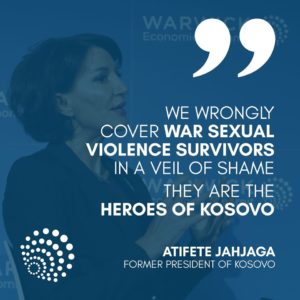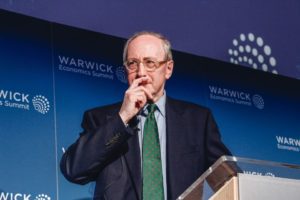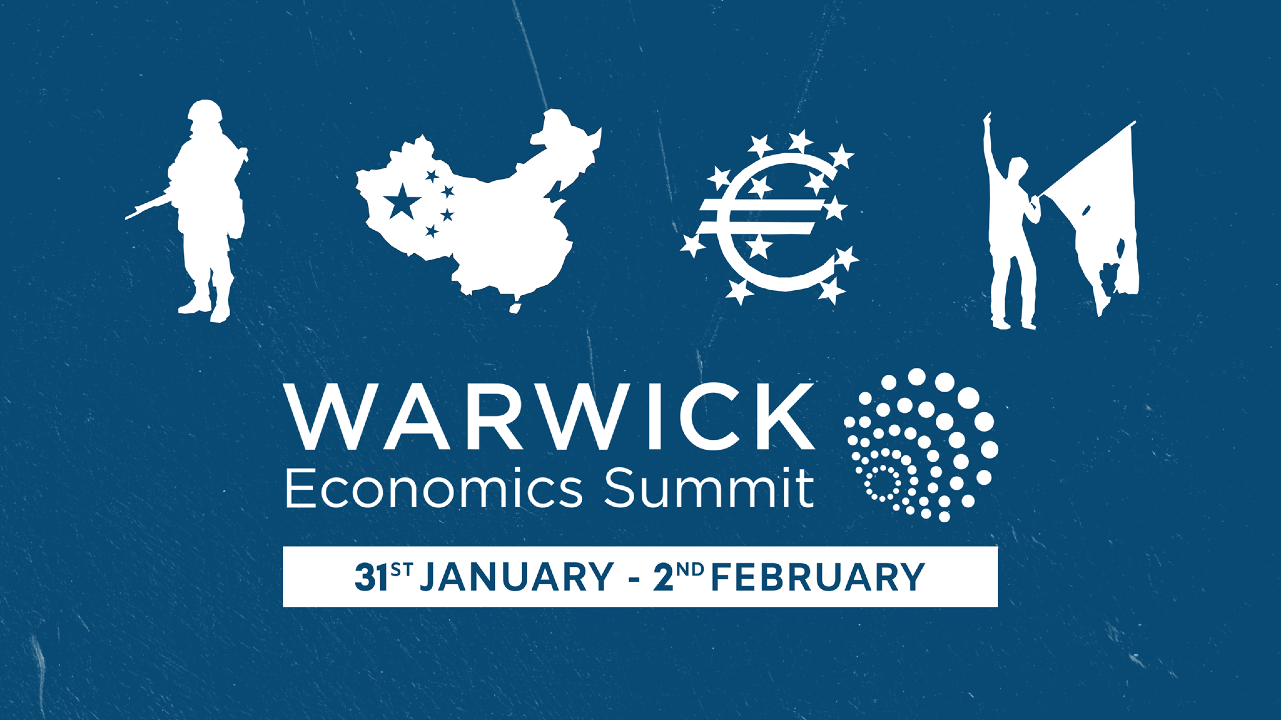WARWICK, UK – Saturday, February 1st, the Stork continued its coverage of the 2020 Warwick Economic Summit.
Dawn’s light broke over a new, ‘free’ United Kingdom. While all around Britain, people woke in excitement and fear of what life without the European Union might be like, in a small town in the West Midlands, Brexit was quickly overshadowed by talks of sexual violence, Western hegemony, and humanitarianism. Day 2 of the Warwick Economic Summit was underway.
Her Excellency, former President Atifete Jahjaga of Kosovo – first female to hold the position in the very young nation’s short history – was the first to take the stage, accompanied by Ms. Rosalind Mathieson, executive editor for international governance for Bloomberg News. The President began by briefly touching upon Kosovo politics and recent events, such as the October 2019 Kosovar Parliamentary elections, before Ms. Mathieson moved onto more pressing issues, including Kosovo’s relations with Serbia, Russia, and other regional and international powers. Her response quickly segued into what would be a major topic of her discussion.

“Rape was used as a tool of war,” President Jahjaga stated mirthlessly, recounting one of the many war crimes committed by Serbian forces during the Kosovo War from 1998 to ’99. For a long time in the years following in Kosovo, those actions remained a staining mark on some women’s history. “[We’d say] you are our shame … a shame on our family, … a shame of society. … we wrongly cover[ed] war sexual survivors in a veil of shame. They are the heroes of Kosovo.” Her Excellency went on to state how Kosovo has worked hard to adopt a new culture, one of “harmony,” for gender and ethnic issues. Through anti-corruption bodies and the empowerment of women, Kosovo has pushed back against the “selective justice” of the past. And despite the threats of protectionism and globalization, the former President was confident in Kosovo’s ability to adapt and overcome.
Next on the podium was Sir Malcolm Rifkind, a man with a long history in British politics and security. Opening his speech with President Lyndon B. Johnson’s famous father/mother quote, the former Defense and Foreign Secretary would be touching upon the “decline of the west,” though he made sure to emphasize the point was very much in question. Even with President Trump’s deep entrenchment in domestic affairs, and the emboldening of Russian and Chinese efforts abroad, Sir Rifkind seemed doubtful of a complete change in the balance of power.

Putin “is not a great strategist … he has been a very foolish leader,” Sir Rifkind summarized, as the Russian President’s efforts to limit the freedom of independent states around him has put him at a greater disadvantage than advantage. As for the Chinese, while they may be far more superior economically, their current government would seem to suffer from pettiness. The former Secretary retold a time the Chinese government tried to “bully” a university into forbidding a Chinese human rights activist from speaking in another conference. “What has saddened me … is that a great country like China … should so misuse its power in such a relatively trivial matter as a debate in a … university.” Should the government remember the wisdom of Deng Xiaoping, and focus its attention towards other interests, it would significantly ease the “deep anxiety” other nations have regarding China, Sir Rifkind theorized.
Following the end of politicians’ speeches, Mr. Yves Daccord stood to speak on risk-taking and the paradox of accountability in the globe in regard to humanitarian efforts. The Director General of the International Committee of the Red Cross expressed that, on the one hand, it seems “we as a collective … as a people … [attribute] an extreme element of accountability [towards elites].” That is to say, the public can be very aware of politicians’ actions, and any mistake could mean removal from office – hence the reason most politicians are very risk averse, often opting not to take actions. On the other hand, the same system that rewards or punishes leaders based on such details allows for war to be conducted “below the level of accountability.” Daccord pointed to Iraq and Afghanistan as clear examples where war powers and actions seem unchecked, though his assessments could be driven towards conflicts around the globe.

He then spoke of how this accountability, and the risks associated with it, were transferred to the ICRC. This comes from both ends of the spectrum – at lower, person-to-person levels, the Director General spoke of ICRC members taking individuals phones at security checkpoints or territorial borders to protect their data and personal information from occupying forces who might confiscated them. At higher levels, it would seem (somewhat) easier for a warlord or terrorist group to trust a humanitarian organization as it passes through or operates in hazardous areas than a opposing state, just as it is easier for governments to task the ICRC with dealing with incoming refugees than to potentially handle the entire issue singlehandedly.
Mr. Daccord then went on to answer difficult questions posed by the students, including a careful answer of factuality for how risks could possibly be quantifiable when considering human lives, before the host students informed the attendees the first half of the day was over. After 3 straight hours of intense subject matters, students were in need of brief break, and headed for the food vendors set up in the Piazza near the Rootes Building. During the Summit’s intermission, many would go on to participate in various seminars, including ones on inequality in education, decentralized finance, and corporate social responsibility. The second day of WES was halfway through, but more was yet come.

Corrections: Article was previously published without an excerpt.







